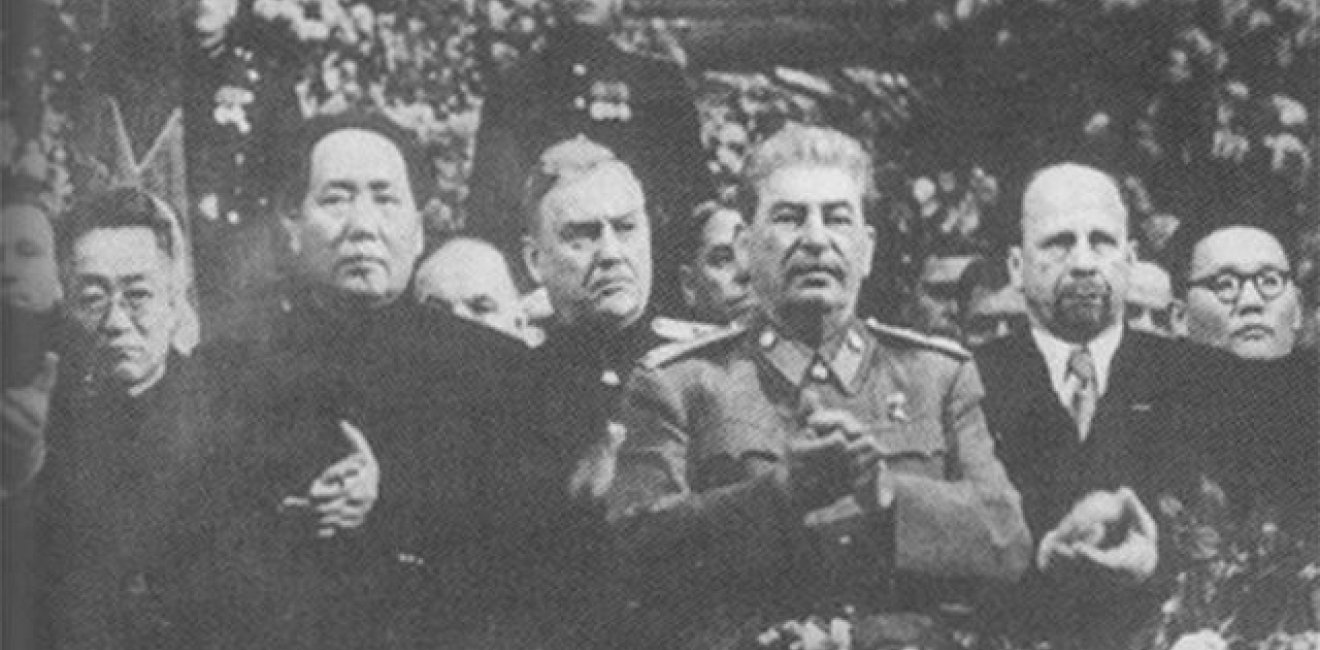On the 70th anniversary of the start of the Korean War, I would like to revisit Stalin’s and Mao’s motivations in their management of this conflict.
As revealed by declassified Russian archives, it was Stalin who, by offering Kim Il Sung in late January 1950 the “green light” to attack the South, was ultimately responsible for the outbreak of the war. Why did Stalin do so? Opinions of scholars differ.
Was this solely because of Dean Acheson’s 12 January 1950 speech excluding Korea from US western Pacific defense perimeter? Or was this just because Stalin intended to bog down the United State in a war quagmire in East Asia, while spreading the Chinese Communist experience of seizing political power via armed struggles to other parts of East Asia? If indeed the above were all the reasons, why did Stalin, in late January 1950, suddenly abandon Moscow’s backing of the Chinese Communist plan of “liberating Taiwan,” which he already was prepared to support? And why did he inspire Kim to launch the war in Korea in such a hurry?
To answer these questions, we must remember that Stalin made decisions always to serve the Soviet Union's strategic interests. He would never make a decision solely to promote China’s interest or to help North Korea.
The key, in my opinion, lay in Lüshun (Port Arthur) and the China Eastern Railway (CER). Both were of critical importance for the Soviet Union’s access to the Pacific Ocean, a consideration that had long occupied a central position in Russian and Soviet security strategies in the Far East.
Thus it is important to note that Stalin endorsed Kim’s war plan in the middle of Mao’s visit to Moscow. At the top of Mao’s wish list for his Soviet visit was to sign a new Sino-Soviet treaty of alliance, which, Mao hoped, would also allow China to reclaim its full sovereignty over Lüshun and CER.
Upon Mao’s arrival in Moscow, Stalin initially showed no interest in signing a new treaty with China, in part because he feared that this would deprive Moscow of the privileges to use Lüshun and CER. In early January 1950, Stalin yielded to Mao’s persistent push and agreed to sign a new treaty. By late January, the negotiations for the details of the treaty had reached a crucial stage. Stalin’s lieutenants, on January 26, proposed signing the treaty while keeping Soviet privileges of accessing Lüshun and CER, which Mao rejected immediately. As a compromise, Zhou Enlai proposed that China would reclaim Lüshun and CER in three years after treaty’s signing.
On January 28, Moscow accepted the Chinese proposal “in principle,” but added a new clause: the Soviet Union might share the use of Lüshun and CER if either China or the Soviet Union was involved in a war in Asia. The Chinese agreed to this clause.
So, if a war occurred in East Asia, the Soviets would continuously be able to use both Lüshun and CER. When the Korean War broke out, the Soviets indeed kept the rights to use Lüshun. Stalin got what he wanted.
This, in my opinion, was the most important reason why Stalin endorsed Kim’s plan to attack the South on January 30, 1950. This, most likely, would cause a war to occur in the Far East.
Mao’s motivations to intervene in Korea were much more complex. He saw China’s responsibilities for the socialist camp (especially for North Korea). He was enraged that US Seventh Fleet had been sent into the Taiwan Strait. He was very concerned about the safety of China’s northeastern borders. Last but not least, he wanted to enhance the Sino-Soviet alliance, so as to consolidate the CCP’s new regime in China.
For Mao, Washington’s blocking of his plan to “liberate Taiwan” meant that a war between China and America had already begun. Before the Inchon landing in September 1950, he thought of sending Chinese troops to Korea, disguised as Korean Peoples’ Army units, to help Kim to win the war. This would eliminate the security threats to China’s northeast while, at the same time, strengthening China’s position in East Asia and allowing the CCP to concentrate on domestic reconstruction. It was also a low-risk way, from a Chinese perspective, to bring the Korean War to a speedy end. Yet this scheme was blocked by Stalin.
After Inchon, North Korean troops were under siege. If Chinese troops were to enter the war immediately, North Korean morale would be boosted and the UN/US forces would be prevented from crossing the 38th parallel. This, however, was again rejected by Stalin.
By early October, the North Korean resistance had collapsed and the UN/US forces had crossed the 38th parallel. China’s entry into war might result in a direct confrontation with the United States. Most leaders in Beijing thus had reservations about, or even opposition to, sending troops to Korea.
However, Mao underscored China’s duty as the leader of Asian revolutions and the need to extinguish the threat to China’s border security. Further, he counted upon Moscow’s promise that it would provide China with weapons and air support. Mao invoked all this to persuade other leaders in Beijing to make the decision to enter the Korean War.
Stalin’s reneging on his promise of Soviet air support, even if it meant giving up North Korea, put Mao in an awkward position. But Mao remained determined to send troops to Korea. He realized that Stalin did not really mean to abandon North Korea. If the Chinese Communists failed to come to the rescue of Kim’s regime, they would totally lose Stalin's trust, which was crucial for them to consolidate their new regime. Beijing had already made an enemy of Washington; if it were to lose Moscow as an ally, it would have been placed in a most undesirable position. Mao also calculated that if Chinese troops, after entering Korea, could maintain a defensive posture and await Soviet military and air support, then China would be able to reduce the risk of fighting a war with the Americans to the minimum.
All of the above essentially was a psychological contest between Mao and Stalin. History’s later developments have shown that Mao made a correct decision based upon accurate judgment. China’s decision to enter the Korean War played a decisive role in convincing Stalin that Mao and his comrades were “genuine internationalist Communists.” Shortly after Chinese troops crossed the Yalu River, Stalin ordered the Soviet air force to help defend the Chinese supply lines. Thereafter, Soviet military and economic assistance poured into China, guaranteeing that Chinese logistical needs in Korea would be met while significantly enhancing China’s overall capacity for domestic economic reconstruction. When Chinese troops successfully drove the enemy forces back to the 38th parallel, North Korea became a security buffer for China. All of this substantially strengthened the foundation of the Sino-Soviet alliance, as well as the CCP’s new regime in China.
However, Mao never forgot Stalin’s suspicion of the Chinese at so critical and historic a moment. Though the Chinese experience in managing the Korean crisis bridged Sino-Soviet differences for the moment, it sowed the seeds for the Sino-Soviet split a decade later.
(Translated by Wang Yiling and John Payne.)








